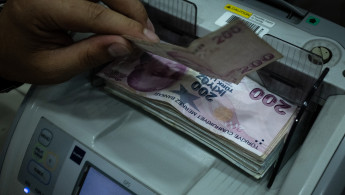Turkish lira steadies after record low as Erdogan doubles down
The Turkish lira held steady on Wednesday after tumbling to a new record low of 14 to the dollar overnight as President Tayyip Erdogan doubled down on his pre-election strategy of sharp rate cuts despite soaring inflation and widespread criticism.
The lira stood at 13.40 against the U.S. currency at 0731 GMT, flat compared with the close on Tuesday when it slumped 8.6%. The greenback also benefited from hawkish U.S. Federal Reserve comments.
The currency has lost as much as 47% of its value this year, down some 30% in November alone, rapidly eroding Turks' earnings and savings, upending household budgets and even leaving them scrambling to find some imported medicines.
Erdogan, for the fifth time in less than two weeks, defended the monetary easing, which most economists have called reckless, in an interview with state broadcaster TRT on Tuesday evening. He said there was "no turning back" from the new policy.
"We will see that the interest rates will fall markedly and hence there will be an improvement in exchange rates before the elections," he said.
Polls are set for no later than mid-2023.
"It's a dangerous experiment Erdogan is trying to run and the market is trying to warn him about the consequences," said Wisconsin-based Brian Jacobsen, senior investment strategist in multi-asset solutions at Allspring Global Investments.
"Imports are likely to rise in price as the lira falls, making inflation worse. Foreign investment could be scared away, making it harder to finance growth. Credit default swaps are pricing in a higher risk of default," he added.
"Investors are getting more and more nervous. ... It's a toxic brew."
Last month's sell-off was among the largest suffered by the lira, comparable with crises which the major emerging market economy faced in 2018, 2001 and 1994.
Erdogan's AK Party, which came to power in the wake of the 2001 crisis, is seeing its support tumble in opinion polls, which show Erdogan would lose head-to-head with the most likely presidential opponents.
Since September, the central bank has cut its policy rate by 400 basis points to 15% under pressure from Erdogan, leaving real rates deeply negative, with inflation near 20%. It is widely expected to lower it again in December.
The opposition has called for an immediate policy reversal and snap elections.
Economists say the depreciation and accelerated inflation - which is seen reaching 30% next year due in large part to the currency devaluation - will derail Erdogan's plan. Virtually all other central banks are raising rates or preparing to do so.
November inflation data will be released on Friday and a Reuters poll forecast that it will rise to an annual 20.7%, the highest level in three years. Istanbul inflation figures will be released at 0900 GMT on Thursday.
The Purchasing Managers' Index (PMI) for manufacturing on Wednesday showed factory activity grew in November, rising to 52 from 51.2 a month earlier, with new export orders and output rising.
(Reuters)





 Follow the Middle East's top stories in English at The New Arab on Google News
Follow the Middle East's top stories in English at The New Arab on Google News
![Netanyahu furiously denounced the ICC [Getty]](/sites/default/files/styles/image_330x185/public/2024-11/GettyImages-2169352575.jpg?h=199d8c1f&itok=-vRiruf5)
![Both Hamas and the Palestinian Authority welcomed the ICC arrest warrants [Getty]](/sites/default/files/styles/image_330x185/public/2024-11/GettyImages-2178351173.jpg?h=199d8c1f&itok=TV858iVg)
